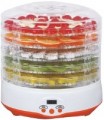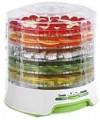Total capacity
The total volume of all dryer trays. The larger the volume, the more products can be loaded into the device at a time. For modern dryers, a capacity of
up to 10 L is considered relatively small,
from 11 to 15 L — medium,
from 16 to 20 L — high, and the largest models can hold
more than 20 L.
Note that if you plan to dry several different types of fruits or vegetables at the same time, it is worth considering not only the total volume of the dryer, but also the number of trays (see above).
Thermostat
The presence of a
thermostat in the dryer — a regulator that allows you to set the temperature in the working chamber. Thus, the temperature regime can be chosen at your discretion — depending on the type of processed products and on the desired degree of drying.
Note that the specific format of this function may be different. The simplest option is a sensor that monitors the temperature in the working chamber and periodically turns on the heating when the air inside begins to cool. Such devices are quite simple and inexpensive. In more advanced dryers, there is another mode: the heater constantly supplies air of a certain temperature to the trays (this temperature is controlled based on data from the temperature sensor). This format is more expensive, but it allows you to provide the most uniform heating and has a positive effect on lifetime of the device.
In turn, the absence of a thermostat means that the dryer has only one operating temperature option. This limits the possibilities accordingly. However, this option also has advantages — simple design, reliability and low cost.
Control
The control panel of a fruit dehydrators.
— Control knob.
Mechanical control is carried out using rotary knobs and switches. Most parameters in such devices are set and controlled manually. In this case, the control elements are connected to the working parts of the dryer directly, without additional electronic circuits. This option is simple, reliable and low cost; however, it is only suitable for the most basic functions, but dehydrators for fruits, vegetables and mushrooms usually do not require more. But the obvious disadvantage of mechanical control is low accuracy: for example, a mechanical timer most often gives an error of a couple of minutes, which in some cases can be critical.
–
Push-button. Push-button control is based on electronic circuits. Such systems are more accurate than mechanical ones (for example, the timer in such dryers can usually be set with an accuracy of several seconds), and more options and modes are provided. On the other hand, such control is more complex and more expensive than mechanical control.
–
Touch. A type of
electronic control with touch switches. Compared to push-button models, it provides a high level of comfort in operation, and looks more modern and aesthetically pleasing. Touch control is found mainly in top models of dehydrators.
Shutdown timer
A special device that turns off the heating after a predetermined time.
The presence of a
timer greatly simplifies the use of the device: instead of monitoring the duration of the process and manually turning off the heater, it is enough to set the desired turn-off time in the settings. In addition, this function reduces the risk of forgetting about drying products and “overexposing” them in the dryer: this can only happen if the timer was initially set for too long.
Note that the type of timer directly depends on the type of control (see above); at the same time, mechanical timers are simple and inexpensive, but they have a rather noticeable error, and electronic ones are very accurate, but they cost accordingly more.
Overheat protection
Security system that turns off the power to the dryer when
the critical temperature in the working chambers is reached. This does not only save food from overdrying, but also prevents more serious consequences in the first place, such as a breakdown or even an ignition in the dryer, which is fraught with fire.

